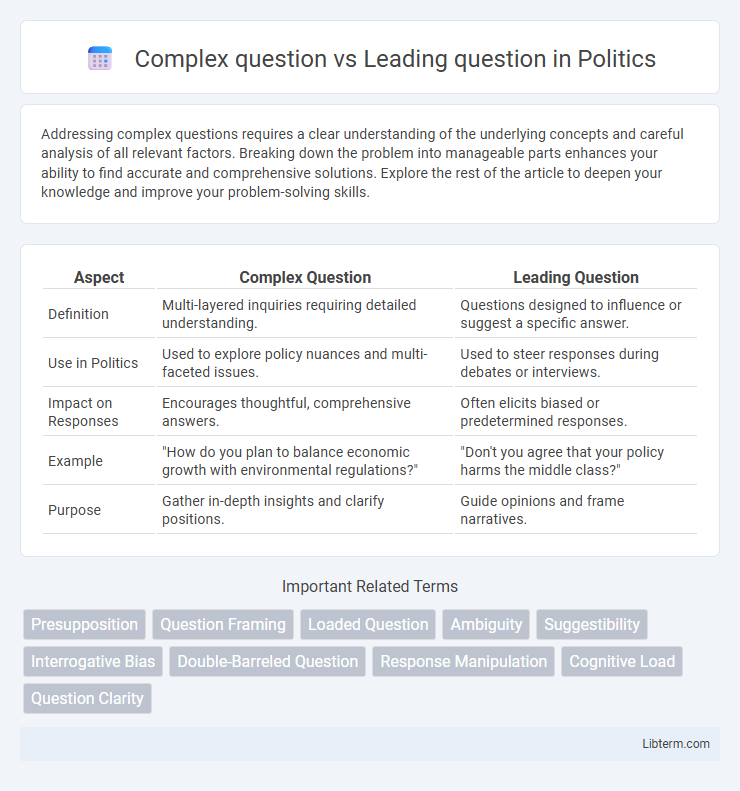Addressing complex questions requires a clear understanding of the underlying concepts and careful analysis of all relevant factors. Breaking down the problem into manageable parts enhances your ability to find accurate and comprehensive solutions. Explore the rest of the article to deepen your knowledge and improve your problem-solving skills.
Table of Comparison
| Aspect | Complex Question | Leading Question |
|---|---|---|
| Definition | Multi-layered inquiries requiring detailed understanding. | Questions designed to influence or suggest a specific answer. |
| Use in Politics | Used to explore policy nuances and multi-faceted issues. | Used to steer responses during debates or interviews. |
| Impact on Responses | Encourages thoughtful, comprehensive answers. | Often elicits biased or predetermined responses. |
| Example | "How do you plan to balance economic growth with environmental regulations?" | "Don't you agree that your policy harms the middle class?" |
| Purpose | Gather in-depth insights and clarify positions. | Guide opinions and frame narratives. |
Understanding Complex Questions
Complex questions often combine multiple inquiries or assumptions, making them challenging to interpret and answer accurately. Understanding complex questions requires identifying each embedded component to avoid confusion or misinterpretation. This contrasts with leading questions, which suggest a particular answer and can bias responses.
Defining Leading Questions
Leading questions are designed to subtly influence the respondent's answer by suggesting a particular response or containing the desired information within the question itself. They often include biased phrasing or assumptions that prompt the respondent toward a specific answer, undermining the reliability of the data collected. In contrast to complex questions, which combine multiple inquiries into one, leading questions shape opinions and can distort the accuracy of survey or interview results.
Key Differences Between Complex and Leading Questions
Complex questions contain multiple parts or require multiple pieces of information, potentially causing confusion or incomplete answers, while leading questions suggest a particular answer or contain assumptions that influence the respondent's response. Complex questions challenge comprehension and clarity, often reducing the accuracy of data collected. Leading questions bias responses by guiding the answer, affecting the reliability and validity of survey or interview results.
Common Examples of Complex Questions
Complex questions often combine multiple queries into one, creating confusion or forcing a single answer to distinct issues. A common example is, "Have you stopped wasting time at work?" which presupposes prior time-wasting behavior. Another example is, "Why did the team fail and who is responsible?" merging two separate questions that demand different responses.
Typical Scenarios for Leading Questions
Leading questions frequently appear in courtroom settings where attorneys aim to guide witnesses toward specific answers, often shaping testimonies to support their case. In survey research, leading questions can bias respondent answers by implying a preferred response, thus compromising data reliability. Marketing interviews utilize leading questions to elicit positive feedback, influencing product perception and consumer behavior.
Psychological Effects on Respondents
Complex questions often trigger cognitive overload in respondents, leading to confusion and inaccurate answers due to the mental strain of processing multiple ideas simultaneously. Leading questions, by contrast, can introduce response bias by subtly directing participants toward a desired answer, thereby compromising the validity of collected data. Both question types impact psychological states differently, with complex questions inducing uncertainty and leading questions influencing opinion formation through suggestive phrasing.
Why Question Framing Matters
Question framing influences response accuracy and bias by shaping how respondents interpret and engage with questions. Complex questions, involving multiple issues or assumptions, can confuse respondents and lead to ambiguous or incomplete answers. Leading questions suggest a particular answer, increasing the risk of response bias and compromising data validity.
Legal and Ethical Implications
Complex questions, often containing multiple assumptions, can inadvertently mislead witnesses or respondents in legal settings, potentially resulting in unreliable or biased testimony. Leading questions suggest a particular answer, risking the infringement of the right to a fair trial by prompting witnesses to confirm a preconceived narrative. Both question types raise significant ethical concerns, as their misuse may compromise the integrity of legal proceedings and violate ethical standards of impartiality and truth-seeking.
Strategies to Avoid Bias in Questioning
Complex questions often confuse respondents by combining multiple queries into one, making it difficult to provide clear answers and increasing the risk of biased responses. Leading questions subtly influence the respondent by implying a desired answer, thereby distorting data integrity. To avoid bias, use clear, single-focus questions with neutral wording and avoid embedding assumptions or suggestions within the question structure.
Improving Question Techniques for Better Responses
Complex questions combine multiple inquiries into one, causing confusion and reducing response accuracy. Leading questions bias answers by suggesting a particular response, undermining objectivity. Enhancing question techniques involves crafting clear, focused, and neutral questions to elicit precise and honest information.
Complex question Infographic

 libterm.com
libterm.com